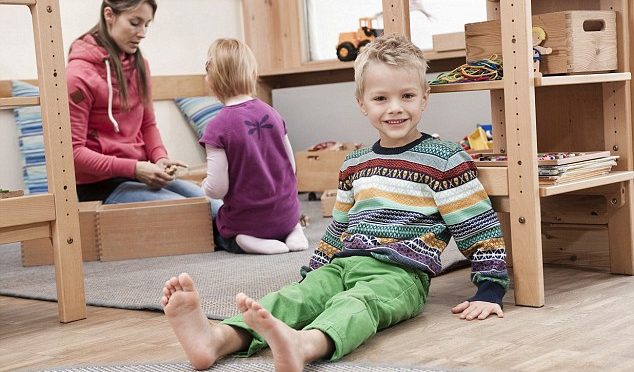Este artículo publicado en The Telegraph me ha dejado sin palabras!!
Tiene muchas frases que no tienen desperdicio:
- Estudio observando más de 10.000 niños en unos 100 colegios de 25 países durante, los 10 últimos años, que dejan los zapatos fuera de la clase, en cursos hasta la universidad. (una muestra sobradamente grande)
- " El último sitio en el que un niño se sentaría a leer es una silla recta y hemos visto que el 95% no lee en sillas en sus casas. Cuando están de vacaciones leen tumbados!
- La factura de limpieza disminuye un 27% y los colegios necesitan comprar menos mobiliario porque no tiene que comprar una silla y una mesa para cada niño, ya que pueden sentarse en el suelo.
- La clave para la concentración es el compromiso y si los niños desean estar allí y disfrutan estándolo, universalmente mejoran"
Schoolchildren with no shoes on 'do better and behave better in the classroom', research shows
‘Shoeless’ children are more likely to arrive to school earlier
Schoolchildren who attend their lessons wearing no shoes are likely to obtain better grades and behave better than those who wear them, a decade-long academic research has revealed.
‘Shoeless’ children are more likely to arrive to school earlier, leave later and read more, according to new research by Bournemouth University.
Researchers have observed tens of thousands of children who leave their shoes outside the classroom and found that pupils are more engaged in their lessons, which in turn leads to better academic attainment.
The last place a child would sit to read is an upright chair and we’ve found that 95 per cent of them actually don’t read on a chair at home. When they go on holidays the read lying down
Professor Stephen Heppell
The research is in line with policies introduced in schools in England where children who go to class shoeless – following the steps of schools in Scandinavia in an effort to improve their academic standards and behaviour.
The study is based on observing and studying tens of thousands of children in over 100 schools in around 25 countries over the last ten years.
Snow forces Scandinavian children to remove shoes
Apart from countries in Scandinavia, researchers have visited schools in New Zealand and Australia. The longest project has taken place in West London where children’s behaviour and academic results were analysed all the way through to university.
For decades children in northern Europe have learned with their shoes off because they are left at the school door arrival due to snow, ice or slush.
And now academics are calling on teachers in England to apply similar ‘shoeless’ policies “to give children the best possible chance of performing in their exams”.
shoeless, classroom, children
Children without shoes in the classroom feel more 'at home', experts say
Experts believe having children with no shoes in the classroom improves their learning because it makes them ‘feel at home’ and more relaxed when learning.
Stephen Heppell, lead researcher and Professor at the Centre for Excellence in Media Practice at Bournemouth University, said: “Children are much more willing to sit on the floor and relax if they have no shoes on.
“The last place a child would sit to read is an upright chair and we’ve found that 95 per cent of them actually don’t read on a chair at home. When they go on holidays the read lying down.
“Having conditions in the classroom that are like those at home means that more boys are reading in the classroom.
“In shoeless schools children also arrive earlier and leave later, which translates into half an hour of extra learning a day on average.
The key to attainment is engagement and if children want to be there and enjoy being there, universally they do better
Professor Stephen Heppel
Wearing no shoes also means the cleaning bill decreased by 27 per cent and schools need to spend less money on furniture because they don’t need to buy a chair and a table for every child as they can sit on the floor.
Prof Heppel said that because “everything is going in their favour” children’s academic standards tend to improve too.
He said: “The key to attainment is engagement and if children want to be there and enjoy being there, universally they do better. When they arrive late and leave early and are disengaged, their performance suffers. Kids with shoes on are less engaged than those without shoes.”
'Shoeless policy'
On his website, Prof Heppel offers advice to schools on how to implement ‘a shoeless’ policy.
He says it should apply to all, including head teachers and guests and children need to be given notice so they are not ridiculed. He explains: “Children need to know their wholly socks will not be exposed to mockery from their peers.”
There are limitations, however. Prof Heppel says: “Short teachers who have been a bit ‘stacked’ by their heels come back down to earth.”
So far theft of shoes left outside the classroom has not been reported as a problem
